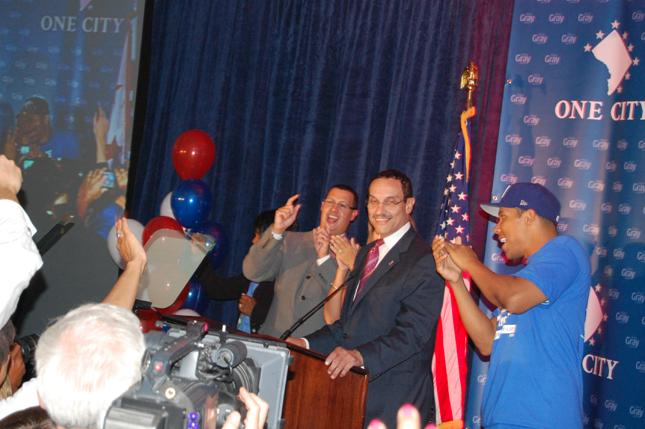A Political Wrap Up
By • June 18, 2013 0 1206

By Tuesday, you might’ve been deceived into thinking nothing had changed in Washington, D.C.
Vincent Gray was still sitting in his accustomed Chairman’s seat as the DC Council returned, preparing to tackle ticklish and problematic issues including a looming budget deficit reported at $100 million.
At Large Councilman Kwame Brown was in his old seat, and so was Democratic At Large Councilman Phil Mendelson and every other member of the council who had stood for re-election. Everyone, including Mary Cheh (Ward Three), Jim Graham (Ward One), David Catania (At large), Harry Thomas Jr. (Ward Five), and Tommy Wells (Ward Six), was there, no worse for the wear and tear of campaigning. Michael A. Brown was in his seat, not confused with the likes of Michael D. Brown.
Mayor Adrian Fenty was still Mayor Adrian Fenty. When last heard, Michelle Rhee was still Chancellor of the District of Columbia Schools.
Everything was the same.
Except that it wasn’t.
Gray was now something else, in addition to being Chairman of the City Council. Gray was now the presumptive mayor of the District of Columbia—the sixth and oldest in its history—having just knocked off the youngest elected mayor in D.C.’s history in the Democratic Primary, September 14. He had done this in an election that revealed a deep economic and racial divide in the city.
The vagaries of the District electoral makeup being what they are, he has still to endure a general election in November. But this, as it has been in the past, should be a mere formality, with Democrats in the District outnumbering Republicans or anything else by an overwhelming margin.
Kwame Brown, as it turned out, easily bested Vincent Orange in the race for Chairman, in spite of some difficulties with financial revelations during the campaign. Phil Mendelson, with a determined effort to make sure voters knew who the real Michael Brown was, managed to fend off an odd challenge from Shadow Senator Michael D. Brown, and a lesser one from Clark Ray.
But Gray’s victory over Fenty still sent a shockwave through the city. For one thing, nobody knew who had won until the wee hours of the morning because of major difficulties at the Board of Elections, where it took a long time to count the votes what with same day registration and new technology.
In the end, Gray carried Wards Eight, Seven, Five and, perhaps most telling, Fenty’s home turf, Ward Four —the same ward where Fenty had first been elected to the council, upsetting long-time veteran Charlene Drew Jarvis. Gray even beat Fenty in Brentwood, the precinct where Fenty made his home. On the other hand, Fenty decisively carried Wards Three and Two, the most white wards of the District, as well as Wards Two and Six, if less decisively.
Early in the campaign, Gray had observed that, “The city was never as divided as it is now.” At the time, that sounded a little like hyperbole, but he was absolutely right. He said the divide was not merely racial but economic — which is to say it was both.
Fenty’s fall was a steep one, and it was based almost solely on the way he ran the government — on the way he conducted himself. Large parts of the city, especially the blacker and poorer parts of the city, felt abandoned, ignored, and left out of the process. This was especially true of the big changes that were begun under Fenty and Chancellor Michelle Rhee in the school system, a system Fenty had vowed to change when he ran the table in the elections of four years ago, winning all wards and precincts. He was seen as arrogant, high-handed, petty and aloof.
Fenty ignored the warnings revealed in two polls, which showed a big disconnect between accomplishment and character, substance and style. He insisted that his accomplishments would carry the day, and during the latter parts of the campaign he did not change. He blasted Gray for his tenure as DHS director under Sharon Pratt Kelly, while praising himself and Chancellor Rhee for making tough decisions.
But there was a failure in leadership. Fenty and Rhee never felt they had to persuade people to come along with the tough decisions, or to show empathy with those most affected by the them; the unemployed, teachers left jobless after two large firings, and so on.
The end result was a 56 to 45 percent Gray margin over Fenty, or 62,174 votes for Gray and 52,000 for Fenty. Kwame Brown won over Orange by a 55 to 39 percent margin. Mendelson beat back Michael D. Brown by 64 to 28 percent margin.
In his first statement after his election victory, Gray promised to bring unity back to the city — in effect, to recreate the “One City” platform he once ran on. “I know this city remains divided, and I promise to do everything in my power to bring this city back together,” he said. “We face grave challenges. Now is the time to move forward. Let now be the time for this city to unite.”
Gray attempted to allay fears on the part of many people that, “I will not turn back the clock,” to earlier political times in the District. He also said he would continue with school reform, making it broader and more inclusive while placing greater emphasis on early childhood and vocational education. He also promised to hold town hall meetings in every ward, to sound out to the entire city. Only a week before the election he had said at a Penn Quarter breakfast that he might resurrect former Mayor Anthony Williams’ Citizens Summit, in which residents from all wards were invited. “We might tweak it a little, but it’s another way to bring the city together.”
Both Gray and Fenty have shown considerable class while planning for a smooth transition,
a process that could prove difficult. At a Democratic Party Unity Breakfast, Fenty hugged Gray and vowed to use all the resources available to him to make for a smooth transfer of power.
No personnel decisions have been made yet, including the one that everyone is most interested
in: the fate of Chancellor Rhee.
If Gray and Fenty have shown grace in victory and defeat respectively, Rhee seemed bent on making things more difficult, whether as an exit strategy or a ploy to give herself room to stay and finish the job she started — an idea floated by some council members. “RHEE IS LIKELY TO HEAD FOR THE DOOR,” the Washington Post front page trumpeted on Friday. This was after comments she had made at a glitzy Newseum premiere of “Waiting for Superman,” a documentary film about education reform in which she was one of the heroines quoted on camera as worrying about the children going to “crappy schools.” More harmful may have been the comment she made at a post-screening panel discussion, in which she said “yesterday’s election results were devastating. Devastating. Not for me, because I’ll be fine, and not even for Fenty, because he’ll be fine, but devastating for the schoolchildren of Washington.” In an e-mail she sent out later, she backtracked saying she meant that if reform were discontinued it would be bad for the children.
Rhee has not been shy in her approach to her job. She made a controversial appearance on the cover of Time magazine bearing a broom she intended to use. She fired principals, closed schools, instituted two large teacher firings, and negotiated a complicated contract with the Washington Teachers Union that included a loosening of tenure rules and some merit pay, as well as the installation of a teacher evaluation system. Under Rhee, test scores went up and infrastructure improved, but school is still out on the overall effect of her tenure.
Gray said he and Rhee would be sitting down and talking soon, although it hasn’t happened
yet. During the campaign, he consistently refused to discuss her fate. “We will talk,” he said the day after the election. “I put in a call to her, although I haven’t heard back from her. I imagine she is busy running the schools.”
An Oprah Winfrey show aired recently (taped before the election) that had Oprah calling
Rhee a warrior woman for turning the D.C. School System upside down.
If Rhee, who did not call to congratulate Gray on his victory, has shown a certain lack of post-election grace, so did Courtland Milloy, the Washington Post columnist, with a column entitled “Ding Dong, Fenty’s Gone. The Wicked Mayor is Gone” — a blast of vitriol. “People who need more time to gloat and wave their fists, take it,” he urged.
Probably not the kind of comments Gray was looking for. On the other side, in addition to Rhee, national journalists warned that reform itself took a hit; school reform was in danger because of the election results.
Yet Gray repeatedly said education reform was his top priority. What he also said during the campaign was that education reform was not about any one person.
- Vince Gray speaking at his Victory party on September 15 in the twilight hours, his son to his left | Robert Devaney



